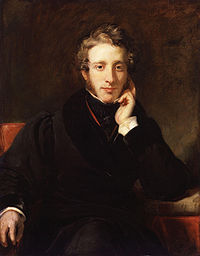- Edward Bulwer-Lytton
-
Edward George Earl Bulwer-Lytton, primer Barón Lytton (Londres, 25 de mayo de 1803 – Torquay, 18 de enero de 1873), fue un novelista, dramaturgo y político británico. Lytton fue un popular escritor de su tiempo que acuñó frases como "La pluma es más fuerte que la espada" y "Perseguir al todopoderoso dólar". Hoy se recuerda mejor su tópico: "Era una oscura y tormentosa noche...".
Bulwer-Lytton era el benjamín de los hijos del general William Earle Bulwer y de Elizabeth Barbara Lytton, hija de Richard Warburton Lytton de Knebworth, Hertfordshire. Tuvo dos hermanos: William (1799-1877) y Henry (1801-1872), después Lord Dalling. Su hijo Robert Bulwer-Lytton, Primer Conde de Lytton, fue virrey de la India desde 1876 a 1880.
Biografía
Su padre murió cuando él tenía cuatro años de edad, después de lo cual su madre trasladó a toda la familia a Londres. Lytton pasó por varios colegios. Niño delicado y neurótico, pero muy precoz, a los 15 años había publicado un libro, aunque de escasa calidad: Ishmael and other Poems.
En 1822 ingresó en el Trinity College, Cambridge, pero enseguida se trasladó al Trinity Hall. En 1825 ganó un premio de poesía, la Chancellor's Medal for English Verse. Al año siguiente se licenció en Artes, publicando un librito de poemas: Weeds and Wild Flowers. Pasó brevemente por el ejército y, contra los deseos de su madre, contrajo matrimonio con Rosina Doyle Wheeler. Su madre, entonces, le retiró la asignación económica, y Lytton tuvo que ponerse a trabajar. En 1836, tras una tormentosa relación, se separó de su mujer. Tres años más tarde ella publicaría una novela en la que caricaturizó a su marido. Estos ataques se prolongarían durante años.
En 1831 resultaría elegido para el Parlamento, puesto que conservó durante nueve años. Su carrera política se prolongó en el tiempo, y no hizo más que prosperar, haciéndole merecedor, entre otros nombramientos, del de Secretario de Estado para las Colonias (1858).
Su carrera literaria se inició en 1820, con sus primeros poemas. Escribió en una gran variedad de géneros, incluyendo ficción histórica, misterio, novela romántica, ocultismo y ciencia-ficción.
Aunque ya era muy popular en su tiempo, por ser un fino estilista victoriano, la prosa de Bulwer-Lytton ha perdido muchos lectores hoy en día, debido a su estilo anacrónico y en exceso acicalado, si bien su libro “Los últimos días de Pompeya” es todavía muy leído.
De sus relatos macabros, como la novela Zanoni o los cuentos Strange story y La casa de los espíritus, señaló H. P. Lovecraft, en su ensayo "El horror sobrenatural en literatura", que pese a sus fuertes dosis de retórica y de hueco romanticismo, el éxito de sus escritos es innegable merced a su habilidad para tejer una cierta clase de singular encantamiento.
Bibliografía
- Eugene Aram (1832)
- Falkland (1827)[3]
- Pelham: or The Adventures of a Gentleman (1828)
- The Disowned (1829)
- Devereux (1829)
- Paul Clifford (1830)
- Eugene Aram (1832)
- Godolphin (1833)
- Falkland (1834)
- The Last Days of Pompeii (1834)
- Rienzi, the last of the Roman tribunes (1835)
- The Student (1835)
- Ernest Maltravers (1837)
- Alice (1838)
- Night and Morning (1841)
- Zanoni (1842)
- The Last of the Barons (1843)
- Lucretia (1846)
- Harold, the Last of the Saxons (1848)
- The Caxtons: A Family Picture (1849)
- My Novel, or Varieties in English Life (1853)
- The Haunted and the Haunters or The House and the Brain (1857)
- What Will He Do With It? (1858)
- A Strange Story (1862)
- The Coming Race or Vril: The Power of the Coming Race (1871)
- Kennelm Chillingly (1873)
- The Parisiens (1873 inacabada)
Enlaces externos
Categorías:- Nacidos en 1803
- Fallecidos en 1873
- Escritores del Reino Unido
- Escritores en inglés
- Cuentistas del Reino Unido
- Ocultistas
- Escritores de terror
Wikimedia foundation. 2010.

